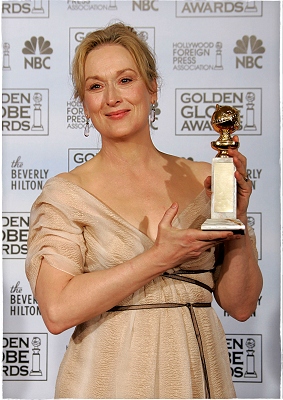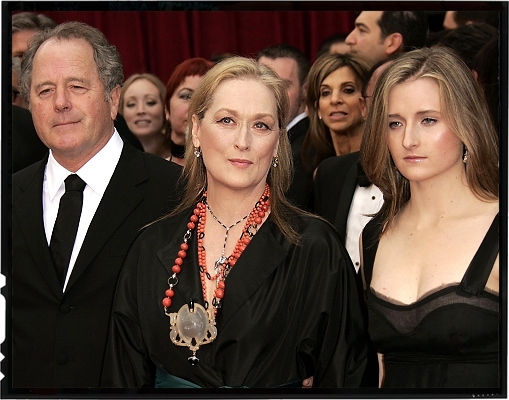
Simply Streep is your premiere source on Meryl Streep's work on film, television and in the theatre - a career that has won her three Academy Awards and
the praise to be one of the world's greatest working actresses. Created in 1999, we have built an extensive collection to discover Miss Streep's work through an
archive of press articles, photos and videos. Enjoy your stay and check back soon. |



For “The Devil Wears Prada”, Meryl Streep won yet another Golden Globe and received nominations for the Screen Actors Guild Award, the BAFTA Film Award and her 14th nomination for an Academy Award. At 57, she was at the top of her game, with four feature films to be released in a single year. Unfortunately, not one of them left a lasting impression. She played a mentor to Chinese students in Chen Shi-zheng’s drama “Dark Matter”, which premiered at the Sundance Film Festival in January of 2007. Its theatrical release date was moved forward after the killing spree of a Chinese student at the University of Virginia. The film was theatrically released in the Spring of 2008 with no promotional effort.
In June 2007, “Evening” released theaters, boasting a strong female ensemble – Vanessa Redgrave, Claire Danes, Toni Collette, Natasha Richardson, Glenn Close – and a first starring role for Meryl’s daughter Mamie (whose “older version” was played in a cameo by Streep), but the film didn’t impress critics and its box office returns were dismal. Meryl played a CIA government official in Gavin Hood’s “Rendition”, who orders the rendition of a young Egyptian living in the USA with his American wife, played by Reese Witherspoon. October saw the release of Robert Redford’s highly anticipated “Lions for Lambs”, an ambitious look at how war affects the lives of soldiers, students, politicians and journalists. Like “Rendition”, the film served as a vignette for different storylines, all connected with each other through the profound impact of the war in Afghanistan. Both films were heavily promoted before their releases, and were both heavily panned by critics and audiences for their bleak subject matters.













